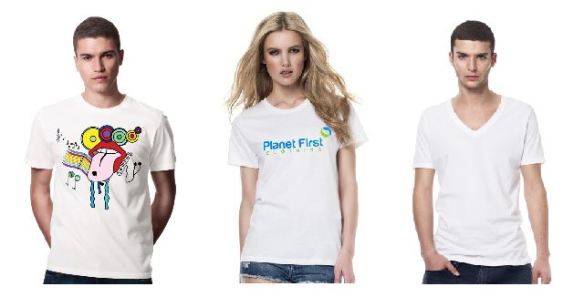Planet First Clothing t-shirts are made from 100% organic cotton, a premium quality material which is both soft and durable. But why choose organic cotton t-shirts rather than conventional cotton t-shirts? In this article we explain the adverse impact of intensive cotton growing and why organic growing methods are better for the environment.
Mainstream Cotton
Conventionally grown cotton is one of the most ecologically destructive crops on the planet. Cotton producers, in response to disease and insect pests, use a chemical arsenal which impacts heavily upon the soil and the surrounding environment. After the prolonged use of chemicals the soil becomes sterile, devoid of the living organisms which promote normal nutrient recovery and plant growth, consequently synthetic fertilisers are applied to reinvigorate the soil.  The scale of this problem can be understood from estimations that cotton production accounts for a quarter of the total volume of pesticides used throughout the world each year. Cotton requires substantial amounts of water to grow, this interacts with water soluble chemicals to create on going problems of groundwater pollution and erosion.
The scale of this problem can be understood from estimations that cotton production accounts for a quarter of the total volume of pesticides used throughout the world each year. Cotton requires substantial amounts of water to grow, this interacts with water soluble chemicals to create on going problems of groundwater pollution and erosion.
Intensive cotton production may also impact adversely on human health and wellbeing in a variety of ways. Pesticides enter the human food chain directly through soil and groundwater contamination, or as a residue within processed foods containing cottonseed oil. Cattle and other stock are routinely fed cottonseed meal and other material salvaged from cotton harvesting. Products sourced from these animals may be contaminated with pesticide residue from the cotton.
Organic Cotton
Organic cotton is a more eco-friendly alternative to conventionally produced cotton which utilises organic farming principles. Organic cotton farming eliminates the use of harmful chemicals, genetically modified organisms, and protects the environment by promoting healthy soils, clean water, and natural biodiversity.
Organic cotton production employs a range of strategies which are fundamentally different from those associated with conventional mainstream cotton farming. In broad terms, organic production is fully integrated within a system which is based on the positive combination of ecological and economic relationships.

100% Organic Cotton T-Shirt – From Planet First Clothing
Organic cotton is more expensive to produce; organic farmers cannot directly compete on price with the high intensity approach of conventional cotton production. Without chemical assistance, growing cotton successfully is dependent on the selection and maintenance of suitable agricultural land. Cotton is well suited to elevated plains with fertile soils, moderate rainfall, and winter frosts which prepare plants for efficient harvesting without the need for chemical defoliants. Natural soil fertility is encouraged through the cropping of green manures, recycling organic materials, and the application of animal manures. Cover crops are useful for soil protection as well as providing habitat for the predatory insects which control the mites, bugs, and aphids which feed on the cotton plants. Because organic crops are usually planted at lower densities than conventional cotton, the harvested yields may be substantially lower on an acreage comparison.
Planet First Clothing and Organic Cotton
At Planet First Clothing we want to be an environmentally sustainable, ethical and socially responsible company. All the cotton used in our t-shirts is sourced from organic cotton growers which means we are different from most suppliers of t-shirts you will find on the high street or online.

All You Need Is Love – 100% Organic Cotton T-Shirt
The entire cotton production process for our t-shirts is controlled and certified by the Soil Association in accordance with the latest version of Global Organic Textile Standard (GOTS). In addition, we only use suppliers who have reduced their emissions to a Climate Neutral standard. The factories that manufacture the cotton and produce our t-shirts are run solely on renewable green energy from wind and solar power. We rely on the Fair Wear Foundation, an independent organisation, to ensure that those who manufacture our t-shirts are treated and paid fairly.

I’m Eco Friendly – 100% Organic Cotton T-Shirt
When you buy a t-shirt from Planet First Clothing you know you are getting a garment that is as environmentally friendly as possible and that it has been made in an ethically responsible manufacturing facility audited by the Fair Wear Foundation in accordance with the Code of Labour Practices, International Labour Organisation conventions and the Universal Declaration of Human Rights.
Visit our online store at www.planetfirstclothing.com and check out all our the organic cotton t-shirts:
Please follow and share our blog
For more information about Planet First Clothing check out the following:
Website: http://www.planetfirstclothing.co.uk
Facebook: www.facebook.com/PlanetFirstClothing
Twitter: @Planet_First
Instagram: www.instagram.com/planetfirstclothing
Pinterest: pfclothing
Blog: www.planetfirstclothing.wordpress.com
Join our newsletter mailing list for up-to-date offers or just send us a comment using the form below:
 Need some new t-shirts for University or College? Planet First Clothing are giving all students, that register for their newsletter, 10% discount on purchases made during August, September and October 2014.
Need some new t-shirts for University or College? Planet First Clothing are giving all students, that register for their newsletter, 10% discount on purchases made during August, September and October 2014.
















